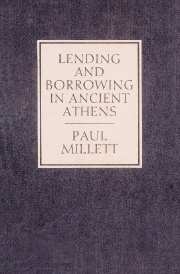Book contents
- Frontmatter
- Contents
- Preface
- I Approaches to lending and borrowing
- II The ideology of lending and borrowing
- III Borrowing and repayment
- IV The rôle of interest
- V Philia and friendship
- VI Non-professional lending: loans without interest
- VII Non-professional lending: loans bearing interest
- VIII Professional money-lending
- IX Conclusion
- Appendices
- Notes
- Bibliography
- Index of passages cited
- Index of papyri
- Index of inscriptions
- General index
VII - Non-professional lending: loans bearing interest
Published online by Cambridge University Press: 20 August 2009
- Frontmatter
- Contents
- Preface
- I Approaches to lending and borrowing
- II The ideology of lending and borrowing
- III Borrowing and repayment
- IV The rôle of interest
- V Philia and friendship
- VI Non-professional lending: loans without interest
- VII Non-professional lending: loans bearing interest
- VIII Professional money-lending
- IX Conclusion
- Appendices
- Notes
- Bibliography
- Index of passages cited
- Index of papyri
- Index of inscriptions
- General index
Summary
MISER, MONEY-LENDER, BORROWER AND THIEF
An anecdote attributed to Antiphon the Sophist (but also found among Aesop's Fables) tells the story of a person in need who
… seeing another man earning much money begged him to lend him some at interest (daneisai epi tokōi). The other refused; and, being of a mistrustful nature, unwilling to help anyone, he carried it off and hid it somewhere. Another man, observing him, filched it. Later, the man who had hidden it returned and could not find it. He was very upset at the disaster, all the more so as he had not lent to the man who had asked him, because then it would have been safe and would have brought him something extra (heteron prosepheren). He went to see the man who had asked for the loan, and bewailed his misfortune, saying that he had done wrong and was sorry not to have granted his request but to have refused it, as his money was completely lost. The other man told him to hide a stone in the same place, and think of his money as his and not lost: ‘For even when you had it, you completely failed to use it; so that now too you can think you have lost nothing.’
Consideration of Antiphon's commentary on the story may conveniently be postponed till later. What matters here is the way in which the wealthy miser is criticized for failing to lend his money at interest. There is no hint of the antipathy towards interest-bearing credit we have encountered in other texts (25–6 and 99–100).
- Type
- Chapter
- Information
- Lending and Borrowing in Ancient Athens , pp. 160 - 178Publisher: Cambridge University PressPrint publication year: 1991
- 1
- Cited by



